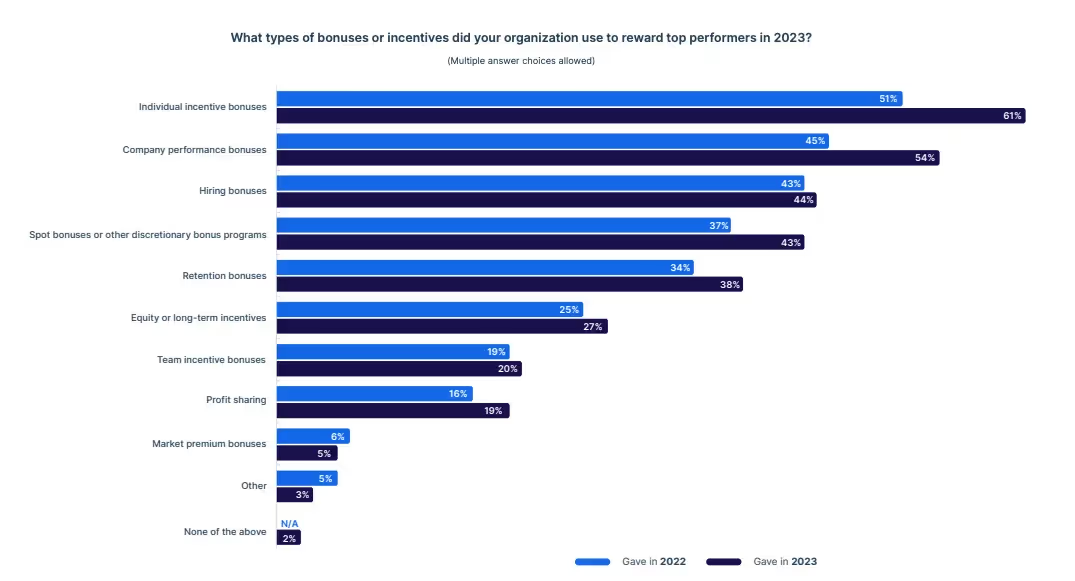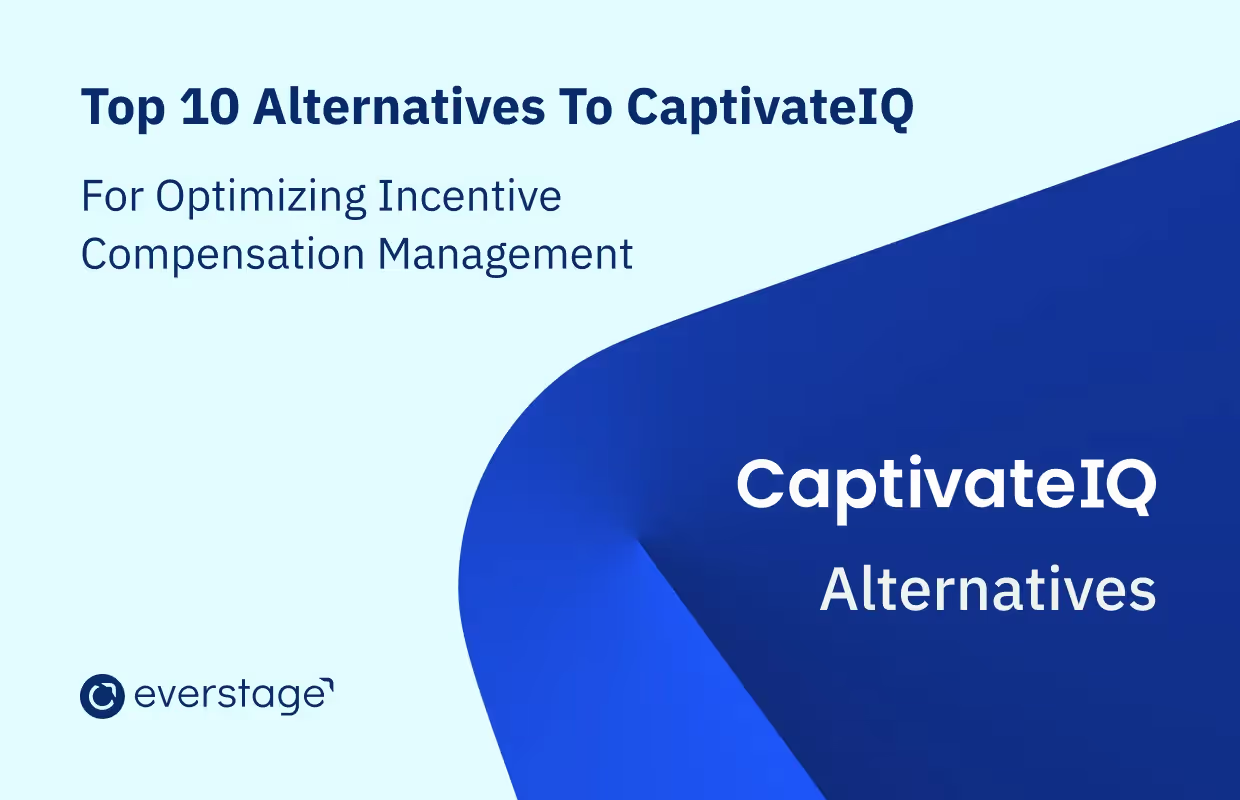Bonuses vs. commissions compares two popular sales incentives, helping you choose the right structure to motivate your team and align with business goals.
- Attract and retain top talent with a well-designed compensation and benefits plan.
- Weigh the impact of predictable bonuses versus performance-driven commissions on motivation and cost.
- Understand how each incentive fits different industries and sales strategies for maximum effectiveness.
Getting your company's compensation and benefits plan right is crucial for attracting and retaining top talent.
As job seekers weigh in on their potential offers, compensation packages—comprising base salary, commissions, bonuses, and other benefits—are a major factor. That said, compensation and related taxes can account for up to 70% of business costs. All this boils down to the importance of getting the compensation strategy right for your company.
Sales bonuses vs. commissions: What’s the difference?
The key difference between bonus plans and commission pays is that bonuses are fixed payments given for reaching specific targets, regardless of the total sales amount—whereas commissions are a percentage of the sales a salesperson generates. The more a sales rep sells, the more they earn.
Let's take the example of Alex, a sales representative who earns a 7% commission on every sale. Another sales rep, Emily, receives a flat $5,000 bonus at the end of the year if she meets her annual sales quota. Will Alex’s sales commission payouts drive more frequent sales efforts compared to Emily’s single, annual bonus?
In this blog post, we'll do a head-to-head comparison of sales bonuses and commissions, how they differ, and when they’re applicable.
Sales bonus vs. commission: Getting the fundamentals right
Is your sales team’s motivation slipping? Deciding whether to use a bonus or commission can make a big difference.
It’s crucial to understand the basics of both incentives to choose the right one for your team.
Understanding bonuses
Bonuses are additional payments made to sales representatives when they hit certain performance benchmarks. They are typically given as a fixed amount based on predetermined metrics.
The different types of bonuses include:
- Quota bonuses: Given for meeting or surpassing sales quotas set by the company.
- Long-term bonuses: Paid out based on performance over an extended period, such as annually.
- Spiff bonuses: Short-term rewards for quickly achieving specific sales goals or completing tasks.
- Volume bonuses: Awarded when sales reps achieve high sales volumes within a specific timeframe.
- Discretionary bonuses: Decided by the management and given at year-end or based on overall performance, often reflecting the company’s appreciation for individual contributions.
Understanding commissions
Commissions are performance-based earnings where sales representatives receive a percentage of the sales they generate. It motivates salespeople to increase their sales efforts as their earnings grow with their sales.
The various commission structures are:
- Straight commission: Sales reps earn a percentage of each sale without a base salary.
- Salary plus commission: Provides a fixed base salary along with a commission on sales.
- Tiered commission: Offers higher commission rates as sales reps achieve higher sales levels.
- Profit-based commission: Commissions are calculated based on the profit margin of sales rather than just the total sales amount.
- Base rate only: Sales reps receive a fixed commission rate with no additional incentives.
- Gross margin commission: This is a commission rate that is based on the profit margin of sales—and it takes into account the difference between the sale price and the Cost of Goods Sold (COGS).
- Draw against commission: This model provides an advance on commissions, which is deducted from future earnings.
- Multiplier commission: It is a commission structure that increases the commission rate when certain performance thresholds or metrics are met.
- Residual commission: Earned on recurring sales such as subscription renewals, residual commission provides ongoing compensation for initial sales efforts.
- Territory volume commission: Commissions are based on the total sales volume within a designated territory.
Doing the math: Examples of bonus and commission calculations
We’ll take a look at detailed examples of different bonus pay and commission structures to understand better how they work.
How to calculate bonus pay [with examples]
Let’s break down how different types of bonuses are calculated:
- Quota bonus
A salesperson receives a $1,000 bonus for meeting their quarterly sales quota of $50,000. If they hit exactly $50,000 in sales, they get the $1,000 bonus.
- Long-term bonus
An employee is eligible for a $3,000 bonus at the end of the year if they meet an annual sales goal of $200,000. If they meet or exceed this goal, they receive the bonus.
- Spiff bonus
A sales rep earns a $200 bonus for selling a new product line within a two-week period. If they manage to sell $10,000 worth of the new product during this period, they get a $200 bonus.
- Volume bonus
A sales rep earns a $500 bonus for selling over $20,000 worth of products in a month.
- Discretionary bonus
At the end of the year, management gives a $1,500 discretionary bonus to a sales rep based on overall performance and contributions to the team.
How to calculate commissions [with examples]
Here’s a breakdown of how popular types of sales commissions are calculated:
- Straight commission
A sales rep earns a 10% commission on each sale. If they make a $50,000 sale, they earn $5,000 in commission.
- Salary plus commission
A sales rep receives a base salary of $3,000 per month plus a 5% commission on sales. If their total sales for the month are $40,000, they earn $2,000 in commission. Their total pay for the month would be $5,000.
- Tiered commission
A sales rep earns a 5% commission on the first $20,000 in sales, 7% on the next $30,000, and 10% on any sales above $50,000. If they make $70,000 in sales, they would earn $1,000 on the first $20,000, $2,100 on the next $30,000, and $2,000 on the remaining $20,000, totaling $5,100 in commission.
- Profit-based commission
A rep earns 15% of the profit margin on each sale. If a product sold for $10,000 with a cost of $6,000, the profit is $4,000. The rep earns $600 in commission (15% of $4,000).
- Residual commission
A sales rep earns an 8% commission on subscription renewals. If a client renews a subscription for $5,000, the rep earns $400 in residual commission.
Comparing bonuses and commissions
While the key differences lie in the payment structure and how much sales reps earn, you also need to consider how each type of incentive impacts various factors within your organization.
Motivational impact
- Short-term vs. long-term motivation
Commissions often drive short-term motivation by directly tying earnings to sales performance. Salespeople are motivated to close more deals to earn more money. Bonuses, however, may offer long-term motivation, encouraging employees to maintain high performance over a more extended period to achieve specific targets or milestones.
- Impact on employee behavior and performance
Commissions can push sales reps to constantly seek new prospects and close deals, fostering a competitive environment. Bonuses may promote consistent effort and loyalty, as they reward achieving or exceeding targets—which can enhance overall job satisfaction and long-term commitment.
Financial planning
- Predictability of income for employees
Bonuses, especially those paid annually or semi-annually, can create a more predictable income stream for employees. Commissions, being variable, depend on sales performance, making income less predictable but potentially higher for top performers.
- Budgeting and financial planning for employers
Bonus plans offer more predictability in budgeting since the amount and timing are usually fixed. Commissions, being based on sales performance, can lead to fluctuations in budget planning, requiring more flexibility in financial management.
Employee preferences
- Survey data on employee preferences
Many employees tend to prefer bonuses considering how they provide a sense of security by offering a fixed amount based on performance.
Consequently, the 2024 Compensation Best Practices Report by Payscale shows that 61% of companies offered individual incentive bonuses in 2023, making it the most popular form of variable pay.

Having said that, as seen in the following Reddit threads, there are sales reps who strongly root for commissions. It ultimately depends on where the sales representative is in their career, the industry they work in, and the company's type of sales compensation plans and sales strategy.


- Factors influencing preference
Preferences can depend on risk tolerance, sales roles, and individual financial needs. Salespeople with a higher risk tolerance might prefer commission-based plans for the potential of higher earnings.
Strategic implementation: Bonuses vs. commissions
Deciding between a bonus or commission-based pay structure depends on various factors, such as:
- The budget for sales incentives
- Sales goals and targets
- Expected frequency of payouts
Addressing these aspects will help you pick the best approach to support your broader business and financial goals.
When to use bonuses
Bonuses are best for rewarding specific milestones, team achievements, or long-term goals.
Best practices for industries and sales roles where bonuses are effective
Bonus plans work well in industries like finance, healthcare, and corporate sales, where performance metrics are tied to long-term goals and complex sales cycles.
Aligning bonuses with company goals
Effective bonus structures tie payouts to key company goals, such as quarterly growth, customer satisfaction, or retention rates.
When to use commissions
Commissions work best in high-pressure, high-reward environments where individual performance drives business outcomes.
Best practices for industries and sales roles where commissions are effective
Industries like real estate, SaaS, insurance, and retail benefit from commission-based structures.
Structuring commission plans for maximum effectiveness
To create a commission plan that works, consider different commission rates for different products or services and set clear sales goals.
Combining both: Taking a hybrid route
Some companies use a hybrid approach, offering both bonuses and commissions and, in turn, providing a balanced incentive plan.
Hybrid models and their advantages
Combining bonuses and commissions is common in industries like software sales, automotive and telecommunications. This approach rewards individual sales performance while also providing a safety net for consistent performers who may not always hit peak numbers.
Examples of companies successfully using both
HubSpot and Salesforce motivate their sales teams with hybrid structures that mix a stable base salary with attractive performance-based commissions and bonuses.
Potential challenges and solutions
When implementing your compensation strategy, it’s crucial to be aware of potential challenges and how to address them effectively.
Challenges to watch out for
Misalignment with company goals
Sales compensation plans that don’t align with your company's objectives can lead to misdirected efforts from your sales team. For instance, if bonuses are tied solely to immediate sales targets—salespeople might focus on quick sales rather than building long-term client relationships.
Complexity in administration
Managing a compensation plan with multiple variables can become complex, leading to errors and inefficiencies in processing payments.
Employee dissatisfaction or turnover
A poorly structured incentive plan that is perceived as unfair or unattainable may demotivate sales reps and increase turnover rates.
Solutions to tackle these challenges
Clear communication of policies
Clearly explain how the chosen type of compensation plan works, including the calculation of bonuses and commissions and their alignment with company goals.
Regular reviews and adjustments
Regularly review and adjust the compensation plan to ensure it remains effective and aligned with company goals. Leveraging advanced sales commission software will make you more efficient in streamlining sales compensations while also enabling you to address any issues before they become significant problems.
Ensuring fairness and transparency
Ensure the compensation plan is fair and transparent. Use objective metrics for performance evaluation and make sure that all sales reps have equal access to earning opportunities.
The perfect pay plan: Bonuses, commissions, or both?
In performance-based pay, bonuses and commissions each have their own advantages. Bonuses provide stability by offering a fixed amount for achieving specific targets, while commissions link earnings directly to sales performance, boosting motivation.
By continuously tailoring and reassessing your incentive plans to align with your organization’s goals, you can motivate sales reps to hit revenue targets and increase your bottom line.


.avif)


.avif)
.avif)

.avif)
.avif)


